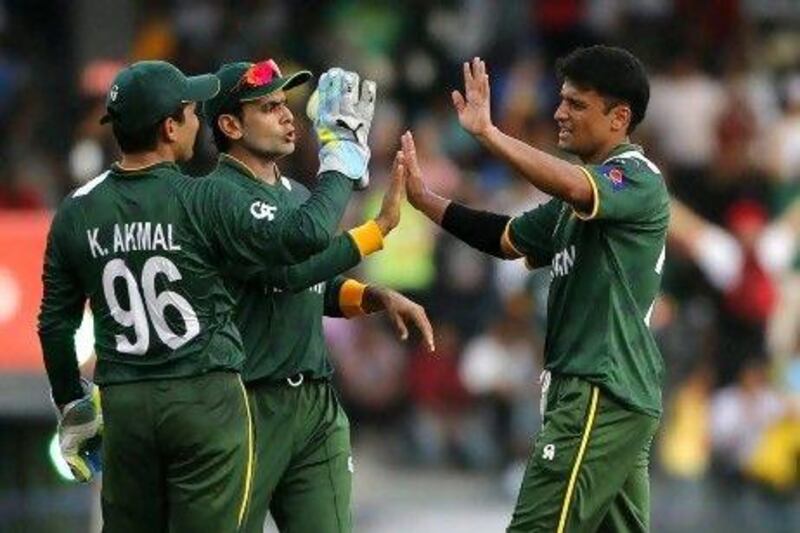COLOMBO // Mohammad Hafeez, we are all coming to see, is a confident man.
That is a handy trait to have as captain. Sometimes he can be a little too confident and that is not nearly as handy.
In the brief time he has led Pakistan, an idea of what he may be like as leader away from the field has formed.
He talks a lot of instilling confidence to players about their place in his scheme of things. By playing Raza Hasan, by sticking by an out-of-sorts Umar Gul, by ignoring the inherent risk of persisting with Imran Nazir, he is demonstrating it, as well.
Some scraps about what he is like on the field have also been clear to see.
He talks a lot to bowlers, he tinkers with the field a lot, he takes his time, he is pretty forward in heading numerous on-field committee meetings.
But last night, as Pakistan clawed out an ultimately miraculous two-wicket win over South Africa in Colombo to get their Super Eights campaign underway, he revealed a bit more about the nuts and bolts of his captaincy, about his grasp of tactics and strategies and above all, his control of situations as they unfold in front of him.
Now Hafeez is through and through a cricket man. If you so wished, you could discuss cricket's many intricacies with him for hours.
Some warn that he probably thinks about the game too much, but he was so on the ball throughout South Africa's batting it was refreshing to see, in particular, his flexibility in decision-making as the innings developed.
His first gambit - opening with Hasan and Yasir Arafat - wasn't completely out of the box; the young, inexperienced Hasan required gumption more than it did tactical nous, and Arafat's elevation above Gul was almost a necessity given Gul's poor form.
But it was continuing with spin as South Africa panicked and especially not using Gul at all until the very death that was the key. Hafeez understood the game's mood and rode it.
Other Pakistan captains would likely have brought in Gul early just because you are supposed to, aren't you?
But Hafeez was fine with restricting what is, after all, his premier fast bowler, low on confidence, to boot, to a limited role.
This may not sound so unorthodox, but given the rigidity his predecessors have generally shown it was a little out there, a little different.
Misbah-ul-Haq's use of Saeed Ajmal in ODIs, in particular, is an insightful example.
So formulaic has it become that oppositions can and have effectively devised - and not had to deviate from - a counter-strategy to minimise the impact of Ajmal.
Hafeez, on the other hand, has consistently used Ajmal as a kind of floating threat, tossed in for one-over spells at moments where he feels the match might be changing.
It has not always worked but it allows flexibility, of a kind that this format rewards well.
Last night he immediately sensed South Africa's nerviness against spin, as well as the nature of the surface, and hurled five different bowlers at them in the first eight overs, including all four of his spinners.
That opening passage of play was not unlike throwing everything from every angle at a dazed opponent; a jab of pace, a couple of hooks of off-spin, an uppercut of leg-spin and a cross of left-arm spin. It was effectively the making of the match.
Such is the fickleness of the game, and Twenty20, especially, however, that all this might not have mattered at all.
Captaincy is as much about those who are captained and much else besides, and ultimately it took an entirely unexpected, even flukey, bout of exceptionally pure hitting from - irony of all ironies - Gul to sneak the win.
More relevantly, Hafeez's counterpart AD de Villiers had a stinker of a game as captain, yet came within balls of winning it.
Why he batted as low as No 6 (and proceeded to look easily the most comfortable against spin) remained a mystery even after he explained that it was part of a game plan.
And incidentally, just like Hafeez, he left arguably his best bowler in this format, Johan Botha, with two overs unused.
He, of course, paid for it.
Follow us
[ @SprtNationalUAE ]





